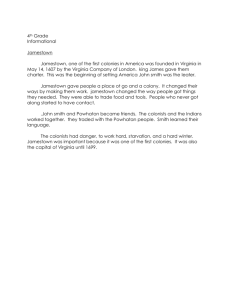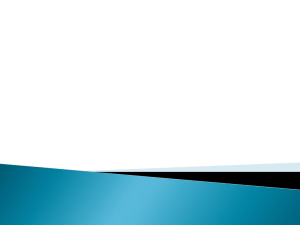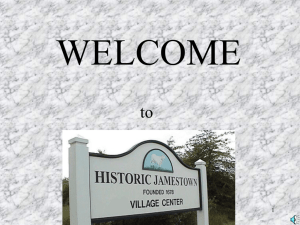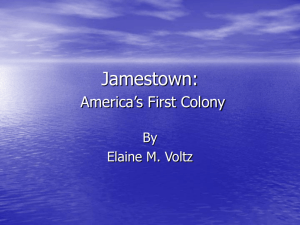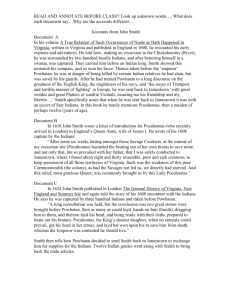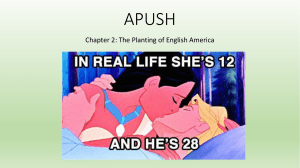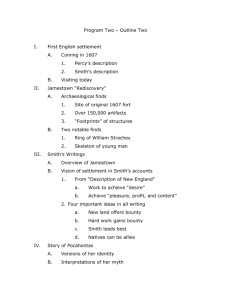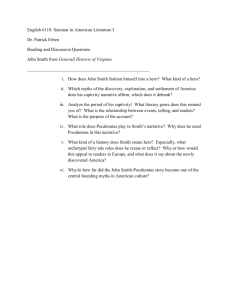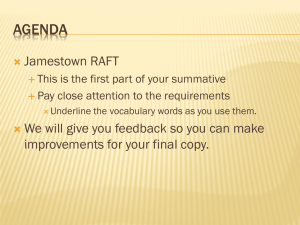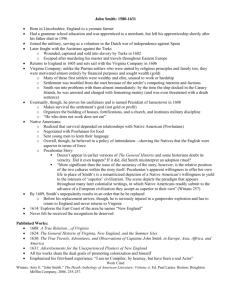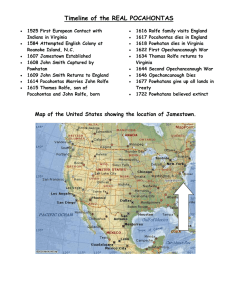The American - English-UniSbg
advertisement
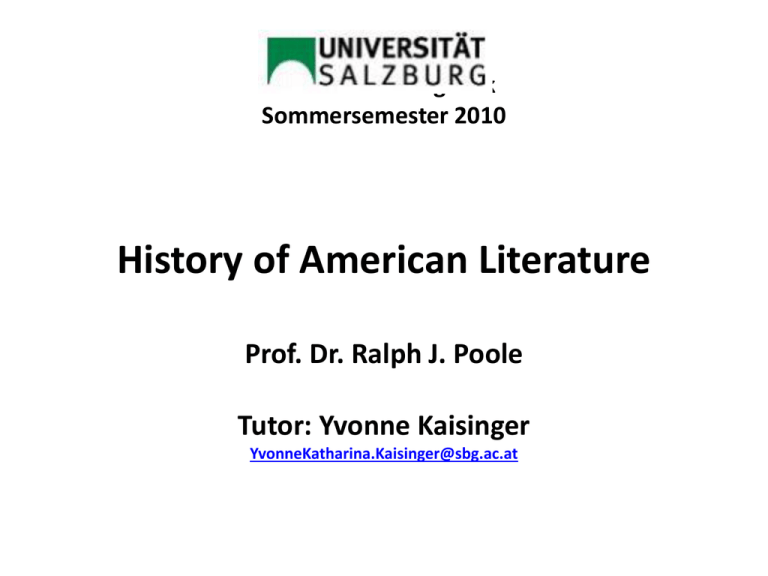
Fachbereich Anglistik Sommersemester 2010 History of American Literature Prof. Dr. Ralph J. Poole Tutor: Yvonne Kaisinger YvonneKatharina.Kaisinger@sbg.ac.at History of American Literature • Survey of basic developments and tendencies of American literature from the Colonial Era to the Present • Various forms, themes, genres of literature • Historical, cultural, social contexts ALWAYS interaction between literary conventions and changing socio-cultural conditions History of American Literature • Amerian Literature as dynamic, open ended process Example: Nathaniel Hawthorne‘s novel The Scarlet Letter (1850) and 17th century Puritan history History of American Literature • Lecture as inspiration for further study • Comparison English and American literature (time frame, genres, epochs, concepts, issues) • Continuous reading important and necessary (READING LIST!!!) History of American Literature • • • • • • • • • • • • Introduction, Colonizing Texts Vision and Mission: The Puritans Revolution and the Word: Early Republic Transcendentalisms and Romanticism Mock Exam Imagining Disaster: Dark Romanticism A House Divided: Slavery and African American Literature Common Vision – Local Experience: Realism, Naturalism, Regionalism Make It New: Experience, Experiment, and Modernism The New Negro: Harlem Renaissance & After After Modernism, After 1945: Postmodernism, Neorealism Final Exam History of American Literature • Norton Anthology of American Literature. Ed. Nina Baym. 7th ed. 2007. • Richard J. Gray. A History of American Literature. 2003. • Recommended Reading: Richard Ruland, Malcolm Bradbury. From Puritanism to Postmodernism: A History of American Literature. 1993. Peter B. High. An Outline of American Literature. 1986. History of American Literature • Is there a History of American Literature? • Is there an autonomous American Literature (apart from English Literature)? • What is American? (Latin America, Caribbean, Canada, Pacific) • When does the History of American Literature begin? Inventing, Discovering, Conquering America • „[She] took his card and read his name: ‚Christopher Newman.‘ Then she read it aloud and laughed at her bad accent. „Your English names are so droll!“ „Droll?“ said Mr. Newman, laughing too. „Did you ever hear of Christopher Columbus?“ „Bien sur! He invented America; a very great man.“ (from Henry James, The American, 1877) Landing of Christopher Columbus, 1492, and Discovering “Indians” Amerigo Vespucci Inventing America • America as imaginary vision of the New World, Terra Nova, Atlantis, Lost Paradise, Garden of Eden, El Dorado, New Canaan, Promised Land … • Legitimizing European expansion of 16/17th centuries (Portugal, Spain, France, Netherlands, England) after the fact Seafarer as Author • Indescribable newness vs expectations of superiors • Assessing the new land as property • “for this purpose I thought of writing on this whole voyage, very diligently, all that I would do and see and experience.” (Columbus) • Text as cultural mediation America as newness and potential • “[the land] is exceedingly fertile […]; it is surrounded with many bays, spacious, very secure, and surpassing any that I have ever seen … [there are] seven or eight kinds of palm trees, which, like all other trees, herbs and fruits, considerably surpass ours in height and beauty […]. The convenience and excellence of the harbours in this island, and the abundance of rivers, so indispensable for the health of man, surpass anything that would be believed by one who had not seen it.” (Columbus) Richard Hakluyt • 1589-1600 • Never was a voyager • Textual appropriation of America • America as “Western Atlantis” as English property America as Literature • America AS Literature before Literature FROM America • 15th century, Age of Discovery: – promise, providence, regeneration – Expansion of power, material profit • Literature as Medium and instrument John Smith’s The General Historie of Virginia, 1624 • American Dream • Mythologized as America’s first self-made man • Walt Disney hero Captain John Smith • Merchant, trader, soldier, pirate, prisoner, slave • Sailed to America in 1606 • Founding of Jamestown 1606 • President of the Virginia Bay Company Captain John Smith “I am no compiler by hearsay, but have been a real actor.” • Jamestown a failure • Lack of survival skills • English gentry unwilling to relinquish their goal of fast profit • Smith’s formula: “he who does not work shall not eat” John Smith & Pocahontas • "at the minute of my execution, she hazarded the beating out of her own brains to save mine; and not only that, but so prevailed with her father, that I was safely conducted to Jamestown" Two Versions… John Smith's 1616 Letter to Queen Anne of Great Britain: Most admired Queen, The love I bear my God, my King and country, hath so oft emboldened me in the worst of extreme dangers, that now honesty doth constrain me to presume thus far beyond myself, to present your Majesty this short discourse: if ingratitude be a deadly poison to all honest virtues, I must be guilty of that crime if I should omit any means to be thankful. So it is, that some ten years ago being in Virginia, and taken prisoner by the power of Powhatan their chief King, I received from this great Salvage exceeding great courtesy, especially from his son Nantaquaus, the most manliest, comeliest, boldest spirit, I ever saw in a Salvage, and his sister Pocahontas, the Kings most dear and well-beloved daughter, being but a child of twelve or thirteen years of age, whose compassionate pitiful heart, of my desperate estate, gave me much cause to respect her: I being the first Christian this proud King and his grim attendants ever saw: and thus enthralled in their barbarous power, I cannot say I felt the least occasion of want that was in the power of those my mortal foes to prevent, notwithstanding all their threats. After some six weeks fatting amongst those Salvage courtiers, at the minute of my execution, she hazarded the beating out of her own brains to save mine; and not only that, but so prevailed with her father, that I was safely conducted to Jamestown: where I found about eight and thirty miserable poor and sick creatures, to keep possession of all those large territories of Virginia; such was the weakness of this poor commonwealth, as had the salvages not fed us, we directly had starved. And this relief, most gracious Queen, was commonly brought us by this Lady Pocahontas. Two Versions… Allegory and Romance • Topos of self-sacrificing victim • Allusion to forbidden love story • Myth: Pocahontas as incarnation of colonists’ desire • Allegory: P. as representations of native people succumb to higher culture • Gender: P. as female continent sacrificing herself to male conqueror History or Advertisement? • • • • • Smith: first-hand experience Written in Third-hand narrative Objectivication and Authentification Defense of Colonization History as Propaganda • http://www.youtube.com/watch?v=ayHFxXzPEvQ&feature=related • http://www.youtube.com/watch?v=-lbnnlT6jmM&feature=related • Video: American Passages: 1. Native Voices (Leslie Marmon Silko, Simon Ortiz, Luci Tapahonso)
